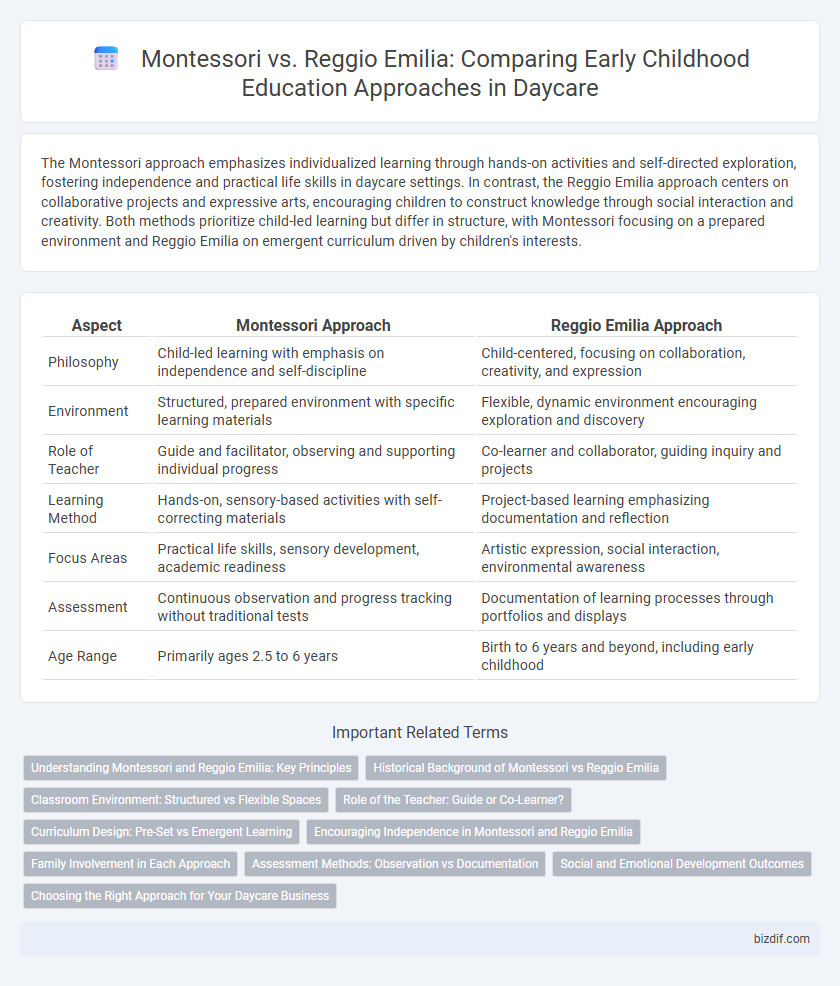The Montessori approach emphasizes individualized learning through hands-on activities and self-directed exploration, fostering independence and practical life skills in daycare settings. In contrast, the Reggio Emilia approach centers on collaborative projects and expressive arts, encouraging children to construct knowledge through social interaction and creativity. Both methods prioritize child-led learning but differ in structure, with Montessori focusing on a prepared environment and Reggio Emilia on emergent curriculum driven by children's interests.
Table of Comparison
| Aspect | Montessori Approach | Reggio Emilia Approach |
|---|---|---|
| Philosophy | Child-led learning with emphasis on independence and self-discipline | Child-centered, focusing on collaboration, creativity, and expression |
| Environment | Structured, prepared environment with specific learning materials | Flexible, dynamic environment encouraging exploration and discovery |
| Role of Teacher | Guide and facilitator, observing and supporting individual progress | Co-learner and collaborator, guiding inquiry and projects |
| Learning Method | Hands-on, sensory-based activities with self-correcting materials | Project-based learning emphasizing documentation and reflection |
| Focus Areas | Practical life skills, sensory development, academic readiness | Artistic expression, social interaction, environmental awareness |
| Assessment | Continuous observation and progress tracking without traditional tests | Documentation of learning processes through portfolios and displays |
| Age Range | Primarily ages 2.5 to 6 years | Birth to 6 years and beyond, including early childhood |
Understanding Montessori and Reggio Emilia: Key Principles
The Montessori approach emphasizes self-directed learning, individualized activities, and creating a prepared environment that fosters independence and sensory-based discovery. The Reggio Emilia approach focuses on collaborative projects, expressive arts, and a strong role for documentation in capturing children's development and learning processes. Both methods prioritize respect for the child's natural development but differ in classroom structure and educator involvement, with Montessori leaning towards structured independence and Reggio Emilia promoting social interaction and creativity.
Historical Background of Montessori vs Reggio Emilia
The Montessori approach, established by Dr. Maria Montessori in the early 1900s, emphasizes self-directed learning and independence through structured, hands-on materials rooted in scientific observation. The Reggio Emilia approach originated post-World War II in the town of Reggio Emilia, Italy, pioneered by Loris Malaguzzi and local educators focused on community involvement and expressive, project-based learning. Both educational philosophies revolutionized early childhood education by challenging traditional methods and prioritizing child-centered, experiential learning environments.
Classroom Environment: Structured vs Flexible Spaces
Montessori classrooms emphasize structured environments with clearly defined areas and accessible materials designed to promote independent learning and order. Reggio Emilia spaces prioritize flexible, open layouts that encourage creativity, collaboration, and exploration through dynamic, child-driven setups. Both approaches create enriching environments tailored to their distinct educational philosophies, impacting how children engage and interact within the daycare setting.
Role of the Teacher: Guide or Co-Learner?
In Montessori daycare settings, the teacher acts primarily as a guide, carefully preparing the environment and providing individualized materials that encourage independent exploration and self-directed learning. In contrast, the Reggio Emilia approach views the teacher as a co-learner who collaborates with children, facilitating inquiry-based projects and fostering a dynamic exchange of ideas through dialogue and reflection. Both methods emphasize respect for the child's interests and capabilities but differ in teacher involvement, with Montessori favoring structured guidance and Reggio Emilia promoting shared discovery.
Curriculum Design: Pre-Set vs Emergent Learning
Montessori curriculum design follows a pre-set structure with carefully sequenced activities aimed at fostering independence and sensory learning. In contrast, the Reggio Emilia approach emphasizes emergent learning, where the curriculum evolves based on children's interests and collaborative projects. Both methods prioritize child-centered education but differ significantly in flexibility and teacher-guided planning.
Encouraging Independence in Montessori and Reggio Emilia
The Montessori approach promotes independence by providing children with structured activities that foster self-directed learning and practical life skills, allowing them to develop confidence through hands-on experiences. In contrast, the Reggio Emilia approach encourages independence by emphasizing collaborative projects and environmental exploration, where children take an active role in their learning through choice and creativity. Both methods prioritize empowering children but differ in their emphasis on individual autonomy versus social interaction and community involvement.
Family Involvement in Each Approach
The Montessori approach encourages family involvement through structured communication and at-home activities that reinforce independence and practical life skills. In contrast, the Reggio Emilia approach emphasizes a collaborative partnership with families, viewing them as active participants and co-constructors of the child's learning experience. Both approaches prioritize strong family engagement but differ in their methods of integrating parents into the educational process.
Assessment Methods: Observation vs Documentation
Montessori approach emphasizes ongoing observation as a key assessment method, allowing educators to tailor activities to each child's developmental stage and interests. Reggio Emilia approach prioritizes documentation, capturing children's work, conversations, and projects to reflect learning processes and support reflective discussions among educators and families. Both methods value qualitative insights but differ in focus: Montessori uses observation for immediate adaptation, while Reggio Emilia employs documentation for collaborative evaluation and long-term learning narratives.
Social and Emotional Development Outcomes
The Montessori approach promotes social and emotional development by encouraging independent play and self-regulation through structured activities and child-led learning. The Reggio Emilia approach enhances social skills and emotional growth by fostering collaboration, communication, and expression within a community-oriented environment. Both methods prioritize respect and empathy, but Reggio Emilia places a stronger emphasis on social interaction and collective problem-solving.
Choosing the Right Approach for Your Daycare Business
Montessori approach emphasizes structured, child-led learning with specific materials promoting independence, making it ideal for daycares seeking a consistent curriculum that fosters self-discipline. Reggio Emilia approach centers on project-based, collaborative exploration driven by children's interests, suitable for daycares prioritizing creativity and community engagement. Selecting the right approach depends on your daycare's educational goals, staff expertise, and the developmental needs of the children you serve.
Montessori approach vs Reggio Emilia approach Infographic

 bizdif.com
bizdif.com